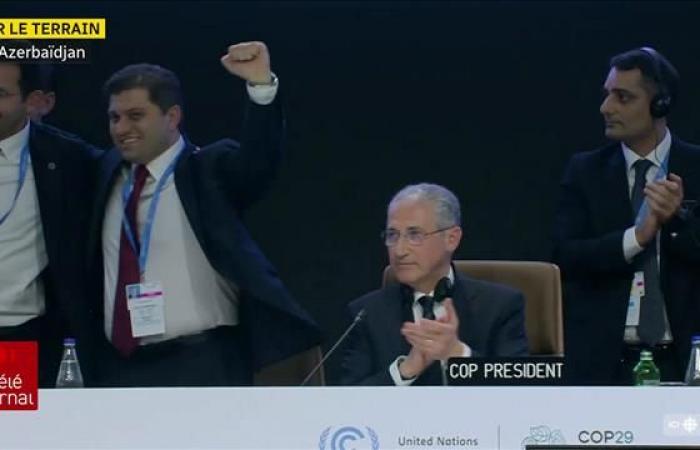
A “difficult”, even “painful” COP29, which ended with a “dismal” agreement. Several countries and environmental groups did not mince their words the day after the financial agreement reached in Baku, Azerbaijan, at the end of the UN climate conference.
I am one of those who believe that no agreement is better than an agreement that sets us back. And that was my fear at one point during the conference, commented the federal Minister of the Environment, Steven Guilbeault, in an interview. I think we managed to save the furniture, but we haven’t made much progress.
A year after the “historic agreement” reached at COP28, the approximately 200 countries gathered in Azerbaijan this year have agreed in the extremes to improve financial support from richer countries to developing ones.
On the other hand, they were unable to agree on further reducing carbon emissions. GES on a global scale, nor to advance the question of the exit from oil, gas and coal.
If we do not jointly demonstrate ambition to reduce pollution, it cannot work. And on this, the result of the Baku conference is disappointing.
It’s like a bandage on a gaping wound as the world increasingly bleeds from the impacts of climate change
illustrated for her part the general director of the Climate Action Network Canada, Caroline Brouillette, joined in Baku where she attended the negotiations.
Host country criticized
Ms. Brouillette is not at her first COP, but this one was particularly difficult
she confides. Firstly because developed countries, including Canada, presented themselves without putting numbers on the table
for the new financing agreement. Azerbaijan was also poorly prepared
and sorely lacked leadership, she adds, recalling that this country is an avowed defender of fossil fuels.
It’s disturbing when we hear a presidency say that oil and gas are a gift from God. [L’Azerbaïdjan] used his role to reduce ambition and even dilute the gains made last year in Dubai [lors de la COP28].
We sometimes had the impression that the government of Azerbaijan was more there to assert its interests rather than being a facilitator or arbiter to create bridges between the positions of different countries
adds Minister Steven Guilbeault.
In the eyes of Andréanne Brazeau, senior policy analyst at the David Suzuki Foundation, COP29 has undermined the credibility of the international climate regime
. Criticizing the disproportionate number of oil and gas lobbyists present at the conference, she believes that Canada and the rest of the West have abandoned the rest of the world
.
If Canada failed to show leadership in Baku, it must do so quickly at home by proposing a fair target for the year 2035, by accelerating the adoption of climate measures currently on the table and, of course , by increasing its contribution to global climate finance
argues Ms. Brazeau.
In detail
The countries present at COP29 needed two additional nights to reach an agreement. At the end of this stormy marathon, to say the least, they agreed to increase the aid paid to developing countries, burdened among other things by successive heatwaves and droughts.
By 2035, countries like Canada, the United States and France — considered historical polluters — will have to provide at least
300 billion dollars per year to poorer countries. This amount is currently $100 billion per year.
This sum, which can be paid in the form of loans or donations, must be used for the energy transition and adaptation to the effects of climate change in countries in the South. It is also part of an overall objective of 1.3 trillion dollars per year mentioned in the agreement.
The amount of 300 billion may seem high, but developing countries have estimated their requests between 500 and 1300 billion dollars annually. A reading shared by experts commissioned by theHIM.
Too little, depending on the country
The amount proposed is pitifully low. It’s ridiculous
launched Indian delegate Chandni Raina. Same story with the delegate from Kenya, Ali Mohamed, speaking on behalf of several African countries.
We are really disappointed. This is a very difficult agreement for developing countries to accept
affirmed on site, at the microphone of -, Namrata Chowdhary, head of public engagement for 350.org, an organization which campaigns for the use of green energies across the globe.
Poor countries and small island states are at the forefront of climate change that they did not cause
vulnerable to increasing natural disasters. And yet, their voices have not been heard, deplores Ms. Chowdhary. They have been pushed against the wall, forced to accept an agreement that will not allow them to adapt to climate change while turning away from fossil fuels, according to her.
For her part, Mariana Paoli, from the Christian Aid organization, regrets the lack of clarity on the promised envelope of 300 billion within ten years. How much will come from public funds and grants rather than loans? It’s sort of an empty promise
she told Agence France-Presse.
The Baku agreement provides that, from now on, climate financing for non-developed countries granted by multilateral development banks can be counted towards the 300 billion objective.
The text also specifies that financial contributions remain volunteers
: China, the world’s largest polluter, refuses to be subject to the same requirements as developed countries in the name of their historical responsibility.
With information from Elisa Serret and Agence France-Presse





